WORK 3202 Authentic Leadership: A Reflective Essay on Self-Leadership
VerifiedAdded on 2023/06/13
|9
|2383
|473
Essay
AI Summary
This essay presents a self-reflection on leadership, focusing on the Authentic Leadership Challenge. It outlines a purpose statement and core values of respect, responsibility, and leadership, detailing the importance of these values in supporting integrity and fairness. The essay describes actions taken to achieve SMART goals related to these values, including community service and mobile application development, while also addressing obstacles encountered such as time constraints and negativity. It explores transactional and transformational leadership theories to explain successes and failures in achieving value-based goals. Ultimately, the reflection highlights lessons learned about self and self-leadership, emphasizing the potential for inspirational leadership and the intention to integrate these lessons into daily life through service and community engagement. Desklib provides a wealth of resources, including similar essays and study tools, to support students in their academic endeavors.
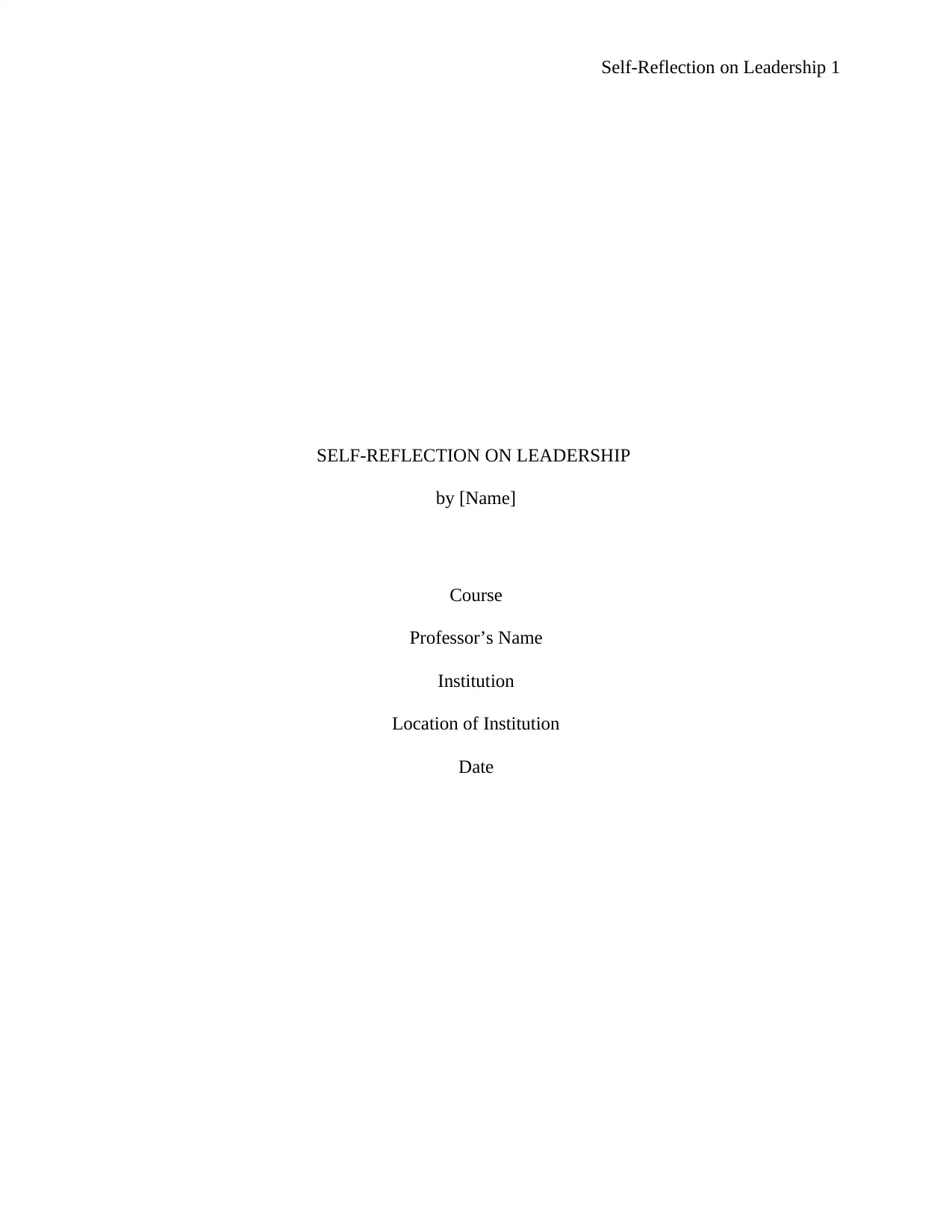
Self-Reflection on Leadership 1
SELF-REFLECTION ON LEADERSHIP
by [Name]
Course
Professor’s Name
Institution
Location of Institution
Date
SELF-REFLECTION ON LEADERSHIP
by [Name]
Course
Professor’s Name
Institution
Location of Institution
Date
Paraphrase This Document
Need a fresh take? Get an instant paraphrase of this document with our AI Paraphraser
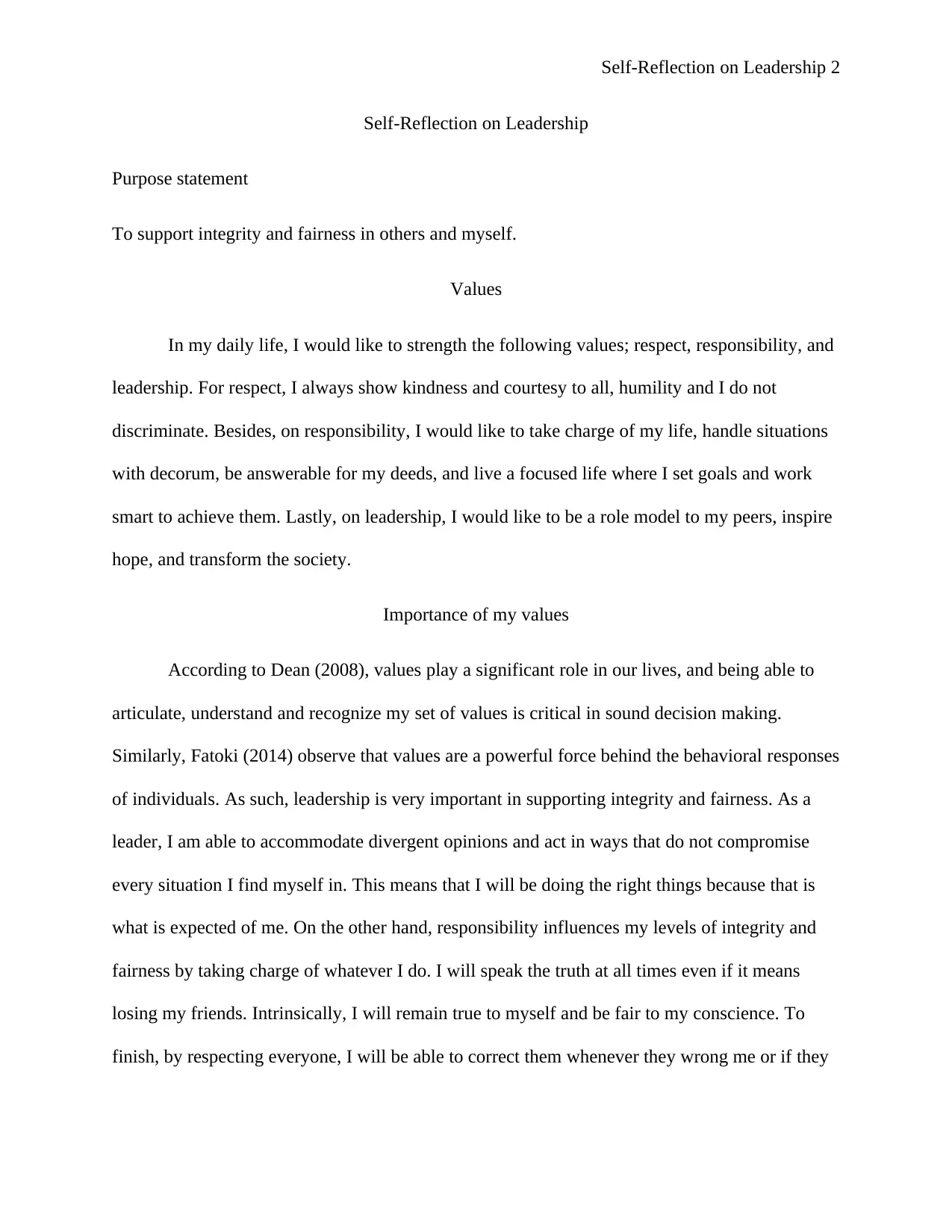
Self-Reflection on Leadership 2
Self-Reflection on Leadership
Purpose statement
To support integrity and fairness in others and myself.
Values
In my daily life, I would like to strength the following values; respect, responsibility, and
leadership. For respect, I always show kindness and courtesy to all, humility and I do not
discriminate. Besides, on responsibility, I would like to take charge of my life, handle situations
with decorum, be answerable for my deeds, and live a focused life where I set goals and work
smart to achieve them. Lastly, on leadership, I would like to be a role model to my peers, inspire
hope, and transform the society.
Importance of my values
According to Dean (2008), values play a significant role in our lives, and being able to
articulate, understand and recognize my set of values is critical in sound decision making.
Similarly, Fatoki (2014) observe that values are a powerful force behind the behavioral responses
of individuals. As such, leadership is very important in supporting integrity and fairness. As a
leader, I am able to accommodate divergent opinions and act in ways that do not compromise
every situation I find myself in. This means that I will be doing the right things because that is
what is expected of me. On the other hand, responsibility influences my levels of integrity and
fairness by taking charge of whatever I do. I will speak the truth at all times even if it means
losing my friends. Intrinsically, I will remain true to myself and be fair to my conscience. To
finish, by respecting everyone, I will be able to correct them whenever they wrong me or if they
Self-Reflection on Leadership
Purpose statement
To support integrity and fairness in others and myself.
Values
In my daily life, I would like to strength the following values; respect, responsibility, and
leadership. For respect, I always show kindness and courtesy to all, humility and I do not
discriminate. Besides, on responsibility, I would like to take charge of my life, handle situations
with decorum, be answerable for my deeds, and live a focused life where I set goals and work
smart to achieve them. Lastly, on leadership, I would like to be a role model to my peers, inspire
hope, and transform the society.
Importance of my values
According to Dean (2008), values play a significant role in our lives, and being able to
articulate, understand and recognize my set of values is critical in sound decision making.
Similarly, Fatoki (2014) observe that values are a powerful force behind the behavioral responses
of individuals. As such, leadership is very important in supporting integrity and fairness. As a
leader, I am able to accommodate divergent opinions and act in ways that do not compromise
every situation I find myself in. This means that I will be doing the right things because that is
what is expected of me. On the other hand, responsibility influences my levels of integrity and
fairness by taking charge of whatever I do. I will speak the truth at all times even if it means
losing my friends. Intrinsically, I will remain true to myself and be fair to my conscience. To
finish, by respecting everyone, I will be able to correct them whenever they wrong me or if they
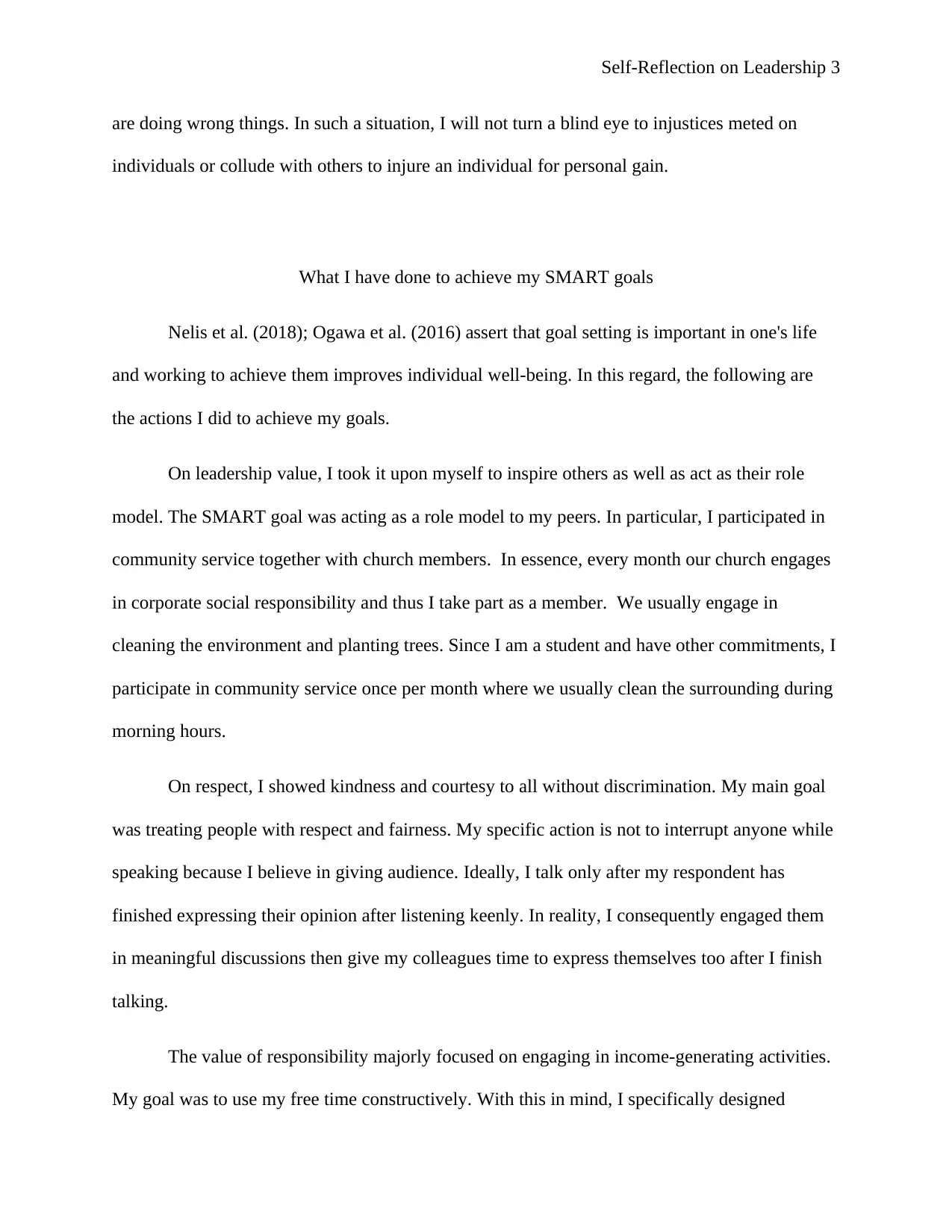
Self-Reflection on Leadership 3
are doing wrong things. In such a situation, I will not turn a blind eye to injustices meted on
individuals or collude with others to injure an individual for personal gain.
What I have done to achieve my SMART goals
Nelis et al. (2018); Ogawa et al. (2016) assert that goal setting is important in one's life
and working to achieve them improves individual well-being. In this regard, the following are
the actions I did to achieve my goals.
On leadership value, I took it upon myself to inspire others as well as act as their role
model. The SMART goal was acting as a role model to my peers. In particular, I participated in
community service together with church members. In essence, every month our church engages
in corporate social responsibility and thus I take part as a member. We usually engage in
cleaning the environment and planting trees. Since I am a student and have other commitments, I
participate in community service once per month where we usually clean the surrounding during
morning hours.
On respect, I showed kindness and courtesy to all without discrimination. My main goal
was treating people with respect and fairness. My specific action is not to interrupt anyone while
speaking because I believe in giving audience. Ideally, I talk only after my respondent has
finished expressing their opinion after listening keenly. In reality, I consequently engaged them
in meaningful discussions then give my colleagues time to express themselves too after I finish
talking.
The value of responsibility majorly focused on engaging in income-generating activities.
My goal was to use my free time constructively. With this in mind, I specifically designed
are doing wrong things. In such a situation, I will not turn a blind eye to injustices meted on
individuals or collude with others to injure an individual for personal gain.
What I have done to achieve my SMART goals
Nelis et al. (2018); Ogawa et al. (2016) assert that goal setting is important in one's life
and working to achieve them improves individual well-being. In this regard, the following are
the actions I did to achieve my goals.
On leadership value, I took it upon myself to inspire others as well as act as their role
model. The SMART goal was acting as a role model to my peers. In particular, I participated in
community service together with church members. In essence, every month our church engages
in corporate social responsibility and thus I take part as a member. We usually engage in
cleaning the environment and planting trees. Since I am a student and have other commitments, I
participate in community service once per month where we usually clean the surrounding during
morning hours.
On respect, I showed kindness and courtesy to all without discrimination. My main goal
was treating people with respect and fairness. My specific action is not to interrupt anyone while
speaking because I believe in giving audience. Ideally, I talk only after my respondent has
finished expressing their opinion after listening keenly. In reality, I consequently engaged them
in meaningful discussions then give my colleagues time to express themselves too after I finish
talking.
The value of responsibility majorly focused on engaging in income-generating activities.
My goal was to use my free time constructively. With this in mind, I specifically designed
⊘ This is a preview!⊘
Do you want full access?
Subscribe today to unlock all pages.

Trusted by 1+ million students worldwide
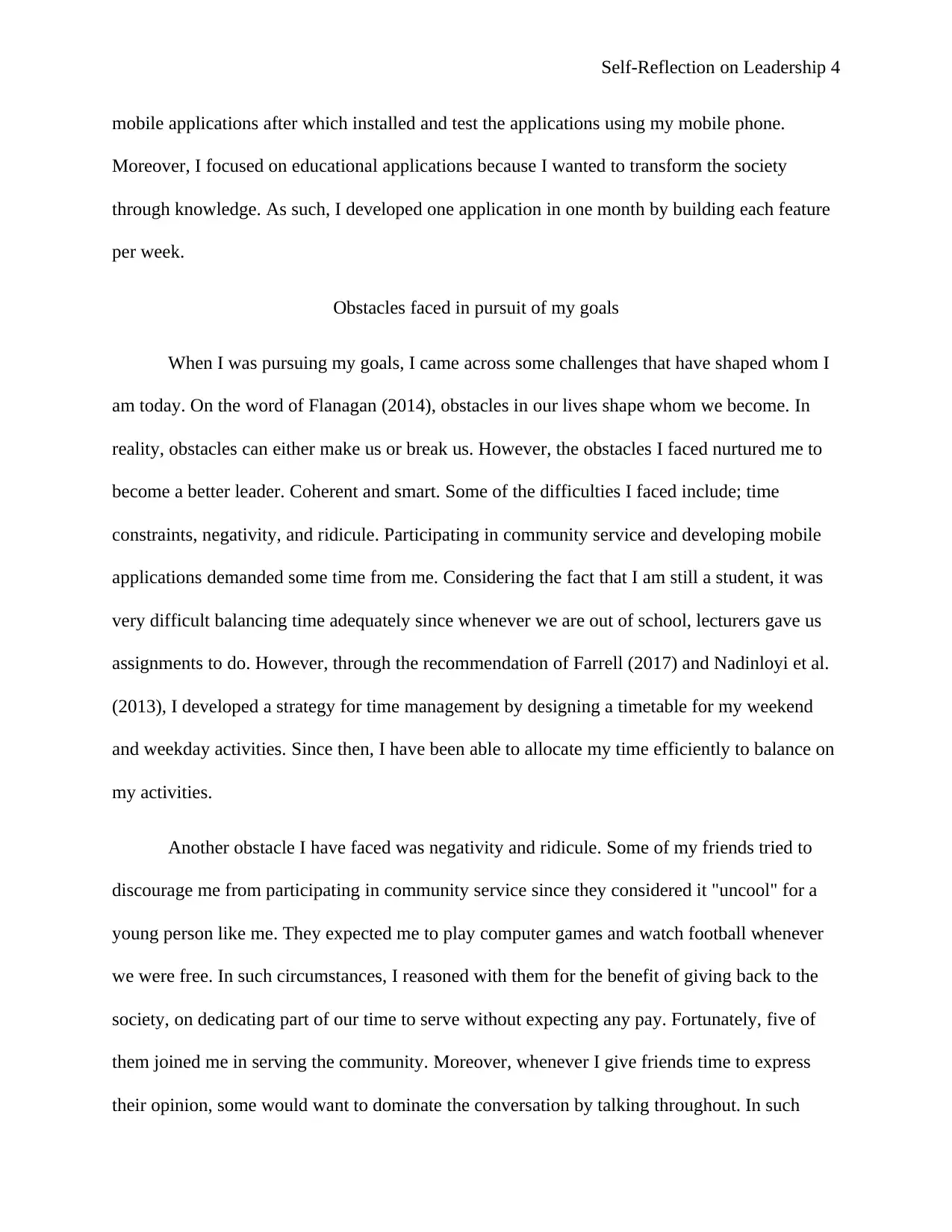
Self-Reflection on Leadership 4
mobile applications after which installed and test the applications using my mobile phone.
Moreover, I focused on educational applications because I wanted to transform the society
through knowledge. As such, I developed one application in one month by building each feature
per week.
Obstacles faced in pursuit of my goals
When I was pursuing my goals, I came across some challenges that have shaped whom I
am today. On the word of Flanagan (2014), obstacles in our lives shape whom we become. In
reality, obstacles can either make us or break us. However, the obstacles I faced nurtured me to
become a better leader. Coherent and smart. Some of the difficulties I faced include; time
constraints, negativity, and ridicule. Participating in community service and developing mobile
applications demanded some time from me. Considering the fact that I am still a student, it was
very difficult balancing time adequately since whenever we are out of school, lecturers gave us
assignments to do. However, through the recommendation of Farrell (2017) and Nadinloyi et al.
(2013), I developed a strategy for time management by designing a timetable for my weekend
and weekday activities. Since then, I have been able to allocate my time efficiently to balance on
my activities.
Another obstacle I have faced was negativity and ridicule. Some of my friends tried to
discourage me from participating in community service since they considered it "uncool" for a
young person like me. They expected me to play computer games and watch football whenever
we were free. In such circumstances, I reasoned with them for the benefit of giving back to the
society, on dedicating part of our time to serve without expecting any pay. Fortunately, five of
them joined me in serving the community. Moreover, whenever I give friends time to express
their opinion, some would want to dominate the conversation by talking throughout. In such
mobile applications after which installed and test the applications using my mobile phone.
Moreover, I focused on educational applications because I wanted to transform the society
through knowledge. As such, I developed one application in one month by building each feature
per week.
Obstacles faced in pursuit of my goals
When I was pursuing my goals, I came across some challenges that have shaped whom I
am today. On the word of Flanagan (2014), obstacles in our lives shape whom we become. In
reality, obstacles can either make us or break us. However, the obstacles I faced nurtured me to
become a better leader. Coherent and smart. Some of the difficulties I faced include; time
constraints, negativity, and ridicule. Participating in community service and developing mobile
applications demanded some time from me. Considering the fact that I am still a student, it was
very difficult balancing time adequately since whenever we are out of school, lecturers gave us
assignments to do. However, through the recommendation of Farrell (2017) and Nadinloyi et al.
(2013), I developed a strategy for time management by designing a timetable for my weekend
and weekday activities. Since then, I have been able to allocate my time efficiently to balance on
my activities.
Another obstacle I have faced was negativity and ridicule. Some of my friends tried to
discourage me from participating in community service since they considered it "uncool" for a
young person like me. They expected me to play computer games and watch football whenever
we were free. In such circumstances, I reasoned with them for the benefit of giving back to the
society, on dedicating part of our time to serve without expecting any pay. Fortunately, five of
them joined me in serving the community. Moreover, whenever I give friends time to express
their opinion, some would want to dominate the conversation by talking throughout. In such
Paraphrase This Document
Need a fresh take? Get an instant paraphrase of this document with our AI Paraphraser
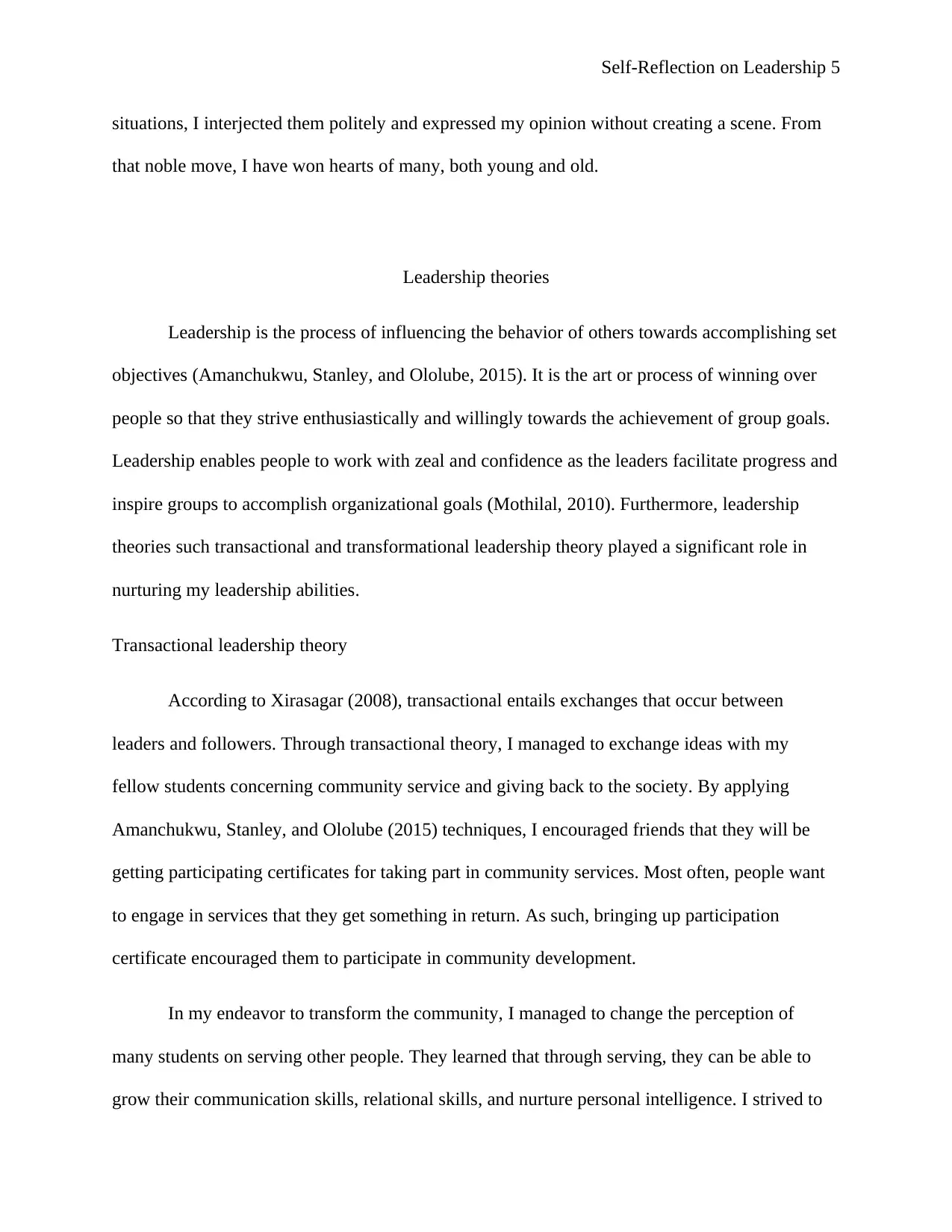
Self-Reflection on Leadership 5
situations, I interjected them politely and expressed my opinion without creating a scene. From
that noble move, I have won hearts of many, both young and old.
Leadership theories
Leadership is the process of influencing the behavior of others towards accomplishing set
objectives (Amanchukwu, Stanley, and Ololube, 2015). It is the art or process of winning over
people so that they strive enthusiastically and willingly towards the achievement of group goals.
Leadership enables people to work with zeal and confidence as the leaders facilitate progress and
inspire groups to accomplish organizational goals (Mothilal, 2010). Furthermore, leadership
theories such transactional and transformational leadership theory played a significant role in
nurturing my leadership abilities.
Transactional leadership theory
According to Xirasagar (2008), transactional entails exchanges that occur between
leaders and followers. Through transactional theory, I managed to exchange ideas with my
fellow students concerning community service and giving back to the society. By applying
Amanchukwu, Stanley, and Ololube (2015) techniques, I encouraged friends that they will be
getting participating certificates for taking part in community services. Most often, people want
to engage in services that they get something in return. As such, bringing up participation
certificate encouraged them to participate in community development.
In my endeavor to transform the community, I managed to change the perception of
many students on serving other people. They learned that through serving, they can be able to
grow their communication skills, relational skills, and nurture personal intelligence. I strived to
situations, I interjected them politely and expressed my opinion without creating a scene. From
that noble move, I have won hearts of many, both young and old.
Leadership theories
Leadership is the process of influencing the behavior of others towards accomplishing set
objectives (Amanchukwu, Stanley, and Ololube, 2015). It is the art or process of winning over
people so that they strive enthusiastically and willingly towards the achievement of group goals.
Leadership enables people to work with zeal and confidence as the leaders facilitate progress and
inspire groups to accomplish organizational goals (Mothilal, 2010). Furthermore, leadership
theories such transactional and transformational leadership theory played a significant role in
nurturing my leadership abilities.
Transactional leadership theory
According to Xirasagar (2008), transactional entails exchanges that occur between
leaders and followers. Through transactional theory, I managed to exchange ideas with my
fellow students concerning community service and giving back to the society. By applying
Amanchukwu, Stanley, and Ololube (2015) techniques, I encouraged friends that they will be
getting participating certificates for taking part in community services. Most often, people want
to engage in services that they get something in return. As such, bringing up participation
certificate encouraged them to participate in community development.
In my endeavor to transform the community, I managed to change the perception of
many students on serving other people. They learned that through serving, they can be able to
grow their communication skills, relational skills, and nurture personal intelligence. I strived to
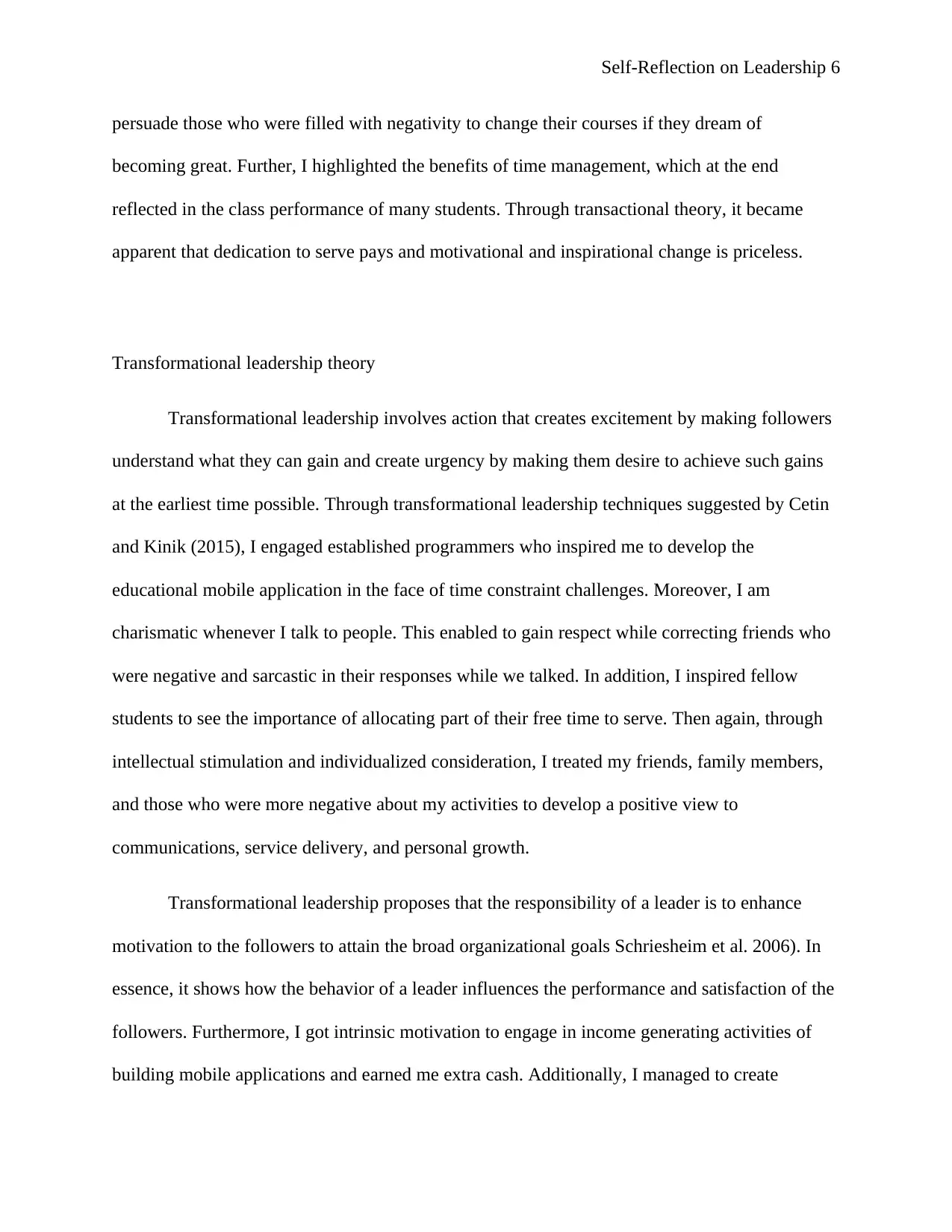
Self-Reflection on Leadership 6
persuade those who were filled with negativity to change their courses if they dream of
becoming great. Further, I highlighted the benefits of time management, which at the end
reflected in the class performance of many students. Through transactional theory, it became
apparent that dedication to serve pays and motivational and inspirational change is priceless.
Transformational leadership theory
Transformational leadership involves action that creates excitement by making followers
understand what they can gain and create urgency by making them desire to achieve such gains
at the earliest time possible. Through transformational leadership techniques suggested by Cetin
and Kinik (2015), I engaged established programmers who inspired me to develop the
educational mobile application in the face of time constraint challenges. Moreover, I am
charismatic whenever I talk to people. This enabled to gain respect while correcting friends who
were negative and sarcastic in their responses while we talked. In addition, I inspired fellow
students to see the importance of allocating part of their free time to serve. Then again, through
intellectual stimulation and individualized consideration, I treated my friends, family members,
and those who were more negative about my activities to develop a positive view to
communications, service delivery, and personal growth.
Transformational leadership proposes that the responsibility of a leader is to enhance
motivation to the followers to attain the broad organizational goals Schriesheim et al. 2006). In
essence, it shows how the behavior of a leader influences the performance and satisfaction of the
followers. Furthermore, I got intrinsic motivation to engage in income generating activities of
building mobile applications and earned me extra cash. Additionally, I managed to create
persuade those who were filled with negativity to change their courses if they dream of
becoming great. Further, I highlighted the benefits of time management, which at the end
reflected in the class performance of many students. Through transactional theory, it became
apparent that dedication to serve pays and motivational and inspirational change is priceless.
Transformational leadership theory
Transformational leadership involves action that creates excitement by making followers
understand what they can gain and create urgency by making them desire to achieve such gains
at the earliest time possible. Through transformational leadership techniques suggested by Cetin
and Kinik (2015), I engaged established programmers who inspired me to develop the
educational mobile application in the face of time constraint challenges. Moreover, I am
charismatic whenever I talk to people. This enabled to gain respect while correcting friends who
were negative and sarcastic in their responses while we talked. In addition, I inspired fellow
students to see the importance of allocating part of their free time to serve. Then again, through
intellectual stimulation and individualized consideration, I treated my friends, family members,
and those who were more negative about my activities to develop a positive view to
communications, service delivery, and personal growth.
Transformational leadership proposes that the responsibility of a leader is to enhance
motivation to the followers to attain the broad organizational goals Schriesheim et al. 2006). In
essence, it shows how the behavior of a leader influences the performance and satisfaction of the
followers. Furthermore, I got intrinsic motivation to engage in income generating activities of
building mobile applications and earned me extra cash. Additionally, I managed to create
⊘ This is a preview!⊘
Do you want full access?
Subscribe today to unlock all pages.

Trusted by 1+ million students worldwide
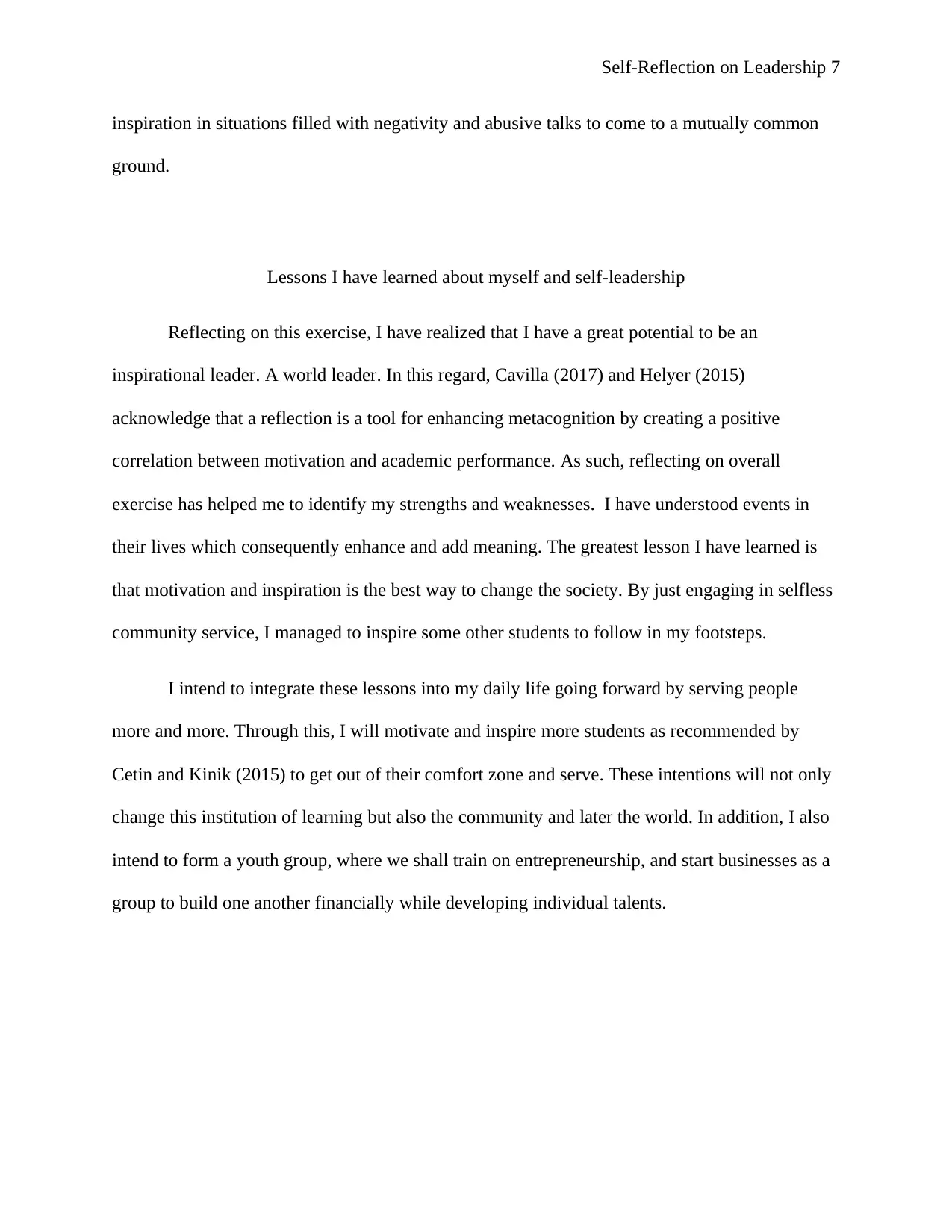
Self-Reflection on Leadership 7
inspiration in situations filled with negativity and abusive talks to come to a mutually common
ground.
Lessons I have learned about myself and self-leadership
Reflecting on this exercise, I have realized that I have a great potential to be an
inspirational leader. A world leader. In this regard, Cavilla (2017) and Helyer (2015)
acknowledge that a reflection is a tool for enhancing metacognition by creating a positive
correlation between motivation and academic performance. As such, reflecting on overall
exercise has helped me to identify my strengths and weaknesses. I have understood events in
their lives which consequently enhance and add meaning. The greatest lesson I have learned is
that motivation and inspiration is the best way to change the society. By just engaging in selfless
community service, I managed to inspire some other students to follow in my footsteps.
I intend to integrate these lessons into my daily life going forward by serving people
more and more. Through this, I will motivate and inspire more students as recommended by
Cetin and Kinik (2015) to get out of their comfort zone and serve. These intentions will not only
change this institution of learning but also the community and later the world. In addition, I also
intend to form a youth group, where we shall train on entrepreneurship, and start businesses as a
group to build one another financially while developing individual talents.
inspiration in situations filled with negativity and abusive talks to come to a mutually common
ground.
Lessons I have learned about myself and self-leadership
Reflecting on this exercise, I have realized that I have a great potential to be an
inspirational leader. A world leader. In this regard, Cavilla (2017) and Helyer (2015)
acknowledge that a reflection is a tool for enhancing metacognition by creating a positive
correlation between motivation and academic performance. As such, reflecting on overall
exercise has helped me to identify my strengths and weaknesses. I have understood events in
their lives which consequently enhance and add meaning. The greatest lesson I have learned is
that motivation and inspiration is the best way to change the society. By just engaging in selfless
community service, I managed to inspire some other students to follow in my footsteps.
I intend to integrate these lessons into my daily life going forward by serving people
more and more. Through this, I will motivate and inspire more students as recommended by
Cetin and Kinik (2015) to get out of their comfort zone and serve. These intentions will not only
change this institution of learning but also the community and later the world. In addition, I also
intend to form a youth group, where we shall train on entrepreneurship, and start businesses as a
group to build one another financially while developing individual talents.
Paraphrase This Document
Need a fresh take? Get an instant paraphrase of this document with our AI Paraphraser
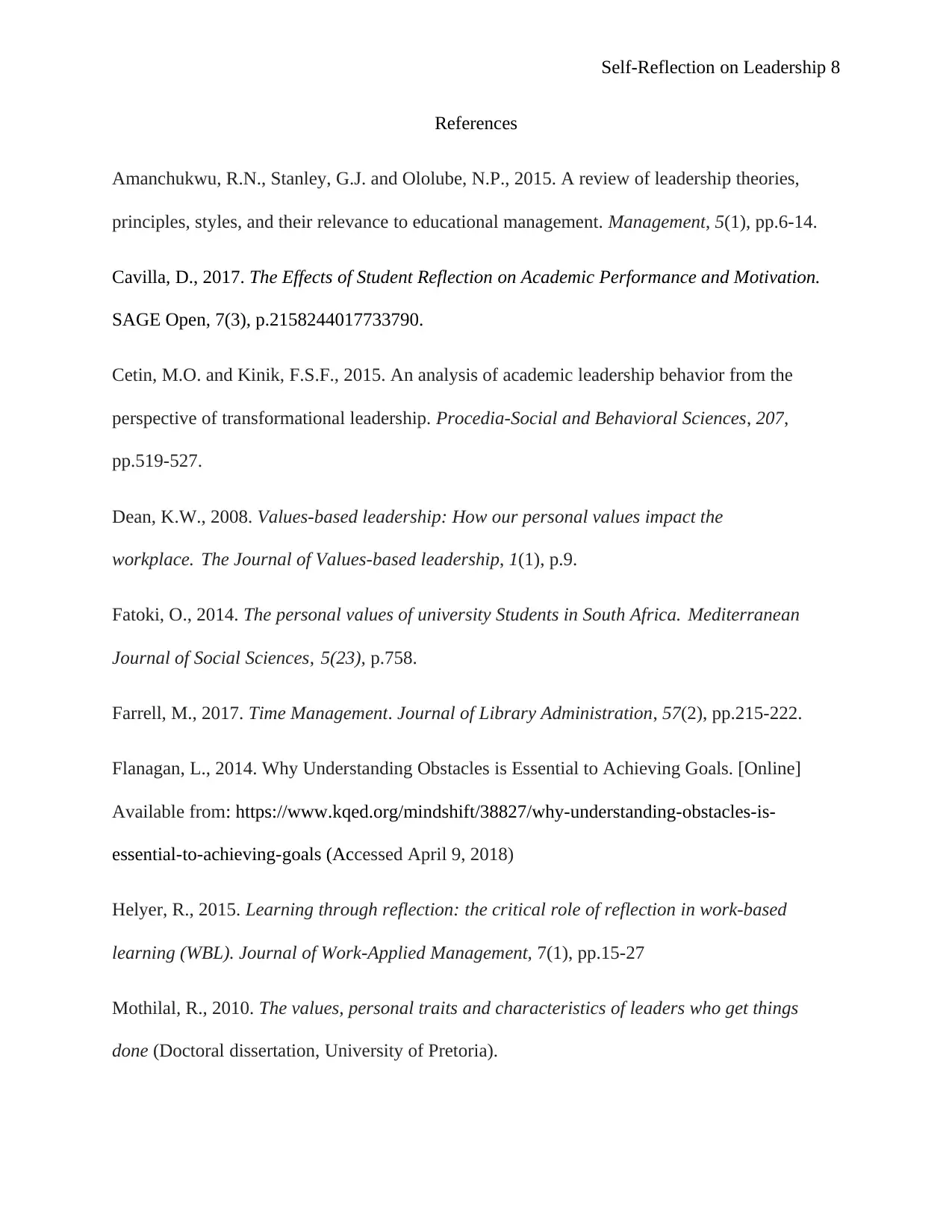
Self-Reflection on Leadership 8
References
Amanchukwu, R.N., Stanley, G.J. and Ololube, N.P., 2015. A review of leadership theories,
principles, styles, and their relevance to educational management. Management, 5(1), pp.6-14.
Cavilla, D., 2017. The Effects of Student Reflection on Academic Performance and Motivation.
SAGE Open, 7(3), p.2158244017733790.
Cetin, M.O. and Kinik, F.S.F., 2015. An analysis of academic leadership behavior from the
perspective of transformational leadership. Procedia-Social and Behavioral Sciences, 207,
pp.519-527.
Dean, K.W., 2008. Values-based leadership: How our personal values impact the
workplace. The Journal of Values-based leadership, 1(1), p.9.
Fatoki, O., 2014. The personal values of university Students in South Africa. Mediterranean
Journal of Social Sciences, 5(23), p.758.
Farrell, M., 2017. Time Management. Journal of Library Administration, 57(2), pp.215-222.
Flanagan, L., 2014. Why Understanding Obstacles is Essential to Achieving Goals. [Online]
Available from: https://www.kqed.org/mindshift/38827/why-understanding-obstacles-is-
essential-to-achieving-goals (Accessed April 9, 2018)
Helyer, R., 2015. Learning through reflection: the critical role of reflection in work-based
learning (WBL). Journal of Work-Applied Management, 7(1), pp.15-27
Mothilal, R., 2010. The values, personal traits and characteristics of leaders who get things
done (Doctoral dissertation, University of Pretoria).
References
Amanchukwu, R.N., Stanley, G.J. and Ololube, N.P., 2015. A review of leadership theories,
principles, styles, and their relevance to educational management. Management, 5(1), pp.6-14.
Cavilla, D., 2017. The Effects of Student Reflection on Academic Performance and Motivation.
SAGE Open, 7(3), p.2158244017733790.
Cetin, M.O. and Kinik, F.S.F., 2015. An analysis of academic leadership behavior from the
perspective of transformational leadership. Procedia-Social and Behavioral Sciences, 207,
pp.519-527.
Dean, K.W., 2008. Values-based leadership: How our personal values impact the
workplace. The Journal of Values-based leadership, 1(1), p.9.
Fatoki, O., 2014. The personal values of university Students in South Africa. Mediterranean
Journal of Social Sciences, 5(23), p.758.
Farrell, M., 2017. Time Management. Journal of Library Administration, 57(2), pp.215-222.
Flanagan, L., 2014. Why Understanding Obstacles is Essential to Achieving Goals. [Online]
Available from: https://www.kqed.org/mindshift/38827/why-understanding-obstacles-is-
essential-to-achieving-goals (Accessed April 9, 2018)
Helyer, R., 2015. Learning through reflection: the critical role of reflection in work-based
learning (WBL). Journal of Work-Applied Management, 7(1), pp.15-27
Mothilal, R., 2010. The values, personal traits and characteristics of leaders who get things
done (Doctoral dissertation, University of Pretoria).
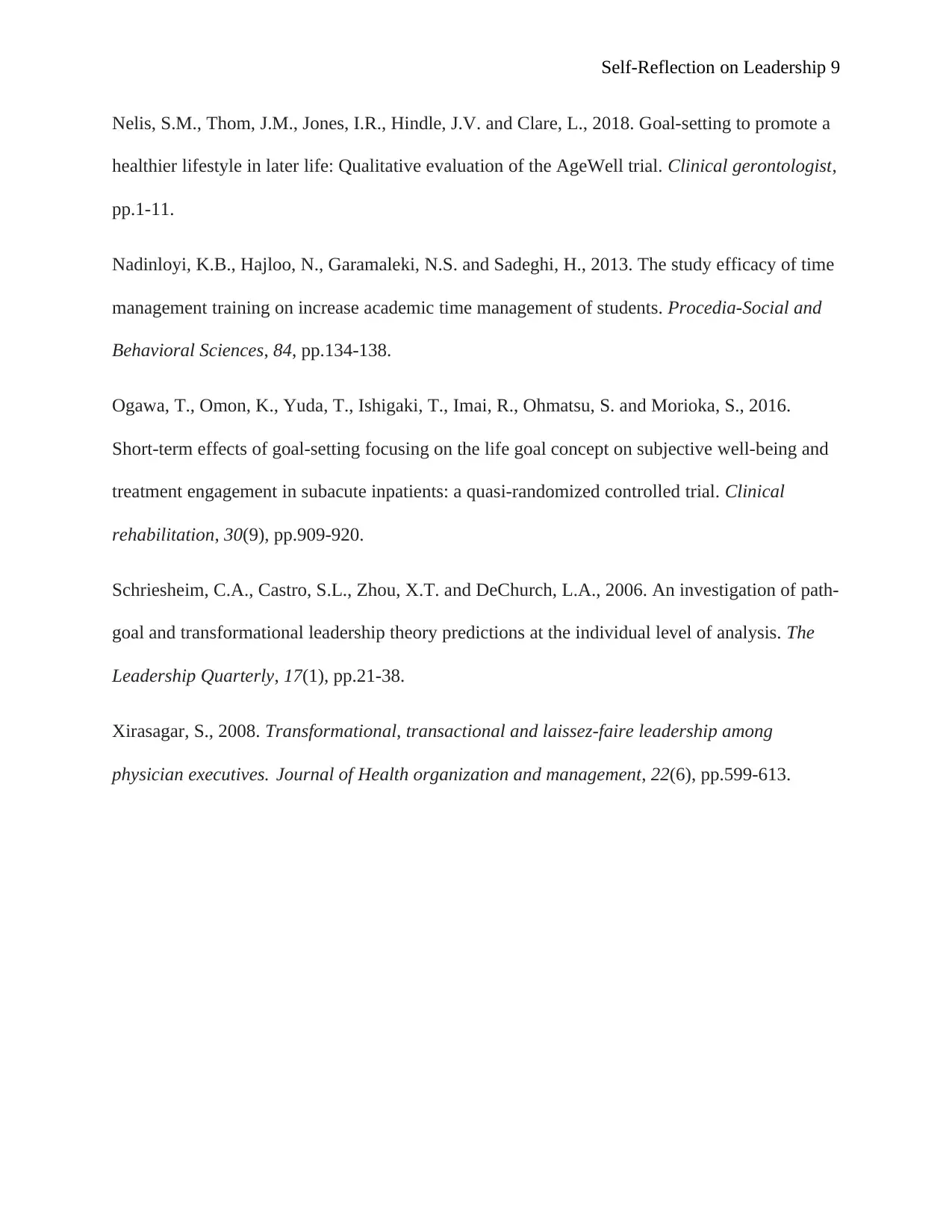
Self-Reflection on Leadership 9
Nelis, S.M., Thom, J.M., Jones, I.R., Hindle, J.V. and Clare, L., 2018. Goal-setting to promote a
healthier lifestyle in later life: Qualitative evaluation of the AgeWell trial. Clinical gerontologist,
pp.1-11.
Nadinloyi, K.B., Hajloo, N., Garamaleki, N.S. and Sadeghi, H., 2013. The study efficacy of time
management training on increase academic time management of students. Procedia-Social and
Behavioral Sciences, 84, pp.134-138.
Ogawa, T., Omon, K., Yuda, T., Ishigaki, T., Imai, R., Ohmatsu, S. and Morioka, S., 2016.
Short-term effects of goal-setting focusing on the life goal concept on subjective well-being and
treatment engagement in subacute inpatients: a quasi-randomized controlled trial. Clinical
rehabilitation, 30(9), pp.909-920.
Schriesheim, C.A., Castro, S.L., Zhou, X.T. and DeChurch, L.A., 2006. An investigation of path-
goal and transformational leadership theory predictions at the individual level of analysis. The
Leadership Quarterly, 17(1), pp.21-38.
Xirasagar, S., 2008. Transformational, transactional and laissez-faire leadership among
physician executives. Journal of Health organization and management, 22(6), pp.599-613.
Nelis, S.M., Thom, J.M., Jones, I.R., Hindle, J.V. and Clare, L., 2018. Goal-setting to promote a
healthier lifestyle in later life: Qualitative evaluation of the AgeWell trial. Clinical gerontologist,
pp.1-11.
Nadinloyi, K.B., Hajloo, N., Garamaleki, N.S. and Sadeghi, H., 2013. The study efficacy of time
management training on increase academic time management of students. Procedia-Social and
Behavioral Sciences, 84, pp.134-138.
Ogawa, T., Omon, K., Yuda, T., Ishigaki, T., Imai, R., Ohmatsu, S. and Morioka, S., 2016.
Short-term effects of goal-setting focusing on the life goal concept on subjective well-being and
treatment engagement in subacute inpatients: a quasi-randomized controlled trial. Clinical
rehabilitation, 30(9), pp.909-920.
Schriesheim, C.A., Castro, S.L., Zhou, X.T. and DeChurch, L.A., 2006. An investigation of path-
goal and transformational leadership theory predictions at the individual level of analysis. The
Leadership Quarterly, 17(1), pp.21-38.
Xirasagar, S., 2008. Transformational, transactional and laissez-faire leadership among
physician executives. Journal of Health organization and management, 22(6), pp.599-613.
⊘ This is a preview!⊘
Do you want full access?
Subscribe today to unlock all pages.

Trusted by 1+ million students worldwide
1 out of 9
Related Documents
Your All-in-One AI-Powered Toolkit for Academic Success.
+13062052269
info@desklib.com
Available 24*7 on WhatsApp / Email
![[object Object]](/_next/static/media/star-bottom.7253800d.svg)
Unlock your academic potential
Copyright © 2020–2026 A2Z Services. All Rights Reserved. Developed and managed by ZUCOL.





